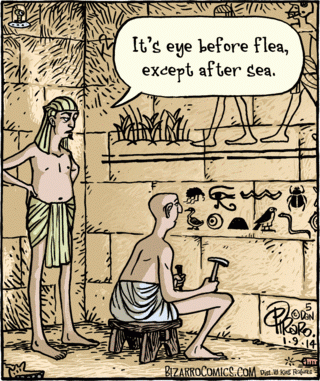This picture just reminds me how thankful I am that English is my native language and I don't have the monstrous task of trying to learn it as a second language. I mean, have you ever really stopped to think about how hard it would be to learn English as a second language? There are so many rules stacked on top of the rules with exceptions to said rules when it comes to spelling alone. We were all raised on these rules so they seem totally commonplace to us, but if you really start to consider the most basic component of the written English language, spelling, it's a marvel that anyone who wasn't conditioned to the language and its inane idiosyncrasies as a young child is able to learn the language at all. I've always like imagine exactly how an teacher of English for non-English native speakers would explain some of the spelling rules that we native speakers probably don't give much thought. Let's explore some of these rules, shall we?
First, silent letters. I remember learning back in kindergarten about how some letters just don't make a sound in words - and we just accepted it, no questions asked. However, if I had started learning English around the same time I started really learning Spanish, I don't think I would have been so accepting. It's right around middle school that you begin to notice when teachers are actually teaching and when you have simply been given "busy" work, so it is also right around that time that you begin looking for the "point" in everything you do in school. It's during this time that I can imagine myself being taught that the "e" at the end of the word "line" does not make a sound, nor does the "k" at the beginning of "knife" bear any consequence, and responding by saying "well why the heck is it there?!" I, like many students, am frustrated by the arbitrary, like busy work, like silent letters. I can't fathom the level of frustration felt by students learning to write English who have to learn to throw an inexplicable extra letter in a word. What's the point?!
Next, let me just talk about words that rhyme, and words that don't. For example, imagine, if you will, a beginner learning to read and write English and he feels he's got a pretty good handle on the sounds each letter makes, and he's even began to grasp blended sounds like the "ou" and "au" sounds. Now you come upon a list of the following words: "cough," "rough," "through". Your teacher wants to know if these words rhyme and you say well of course they do! We English speakers would snicker at this poor soul's ignorance - of course those words don't rhyme! But if said person then asked us to explain why these words don't rhyme, we'd be absolutely stumped. Logically, one would think that words that are using the same sound combinations would sound alike but we know very well how that is not the case. Now we have to explain why while "cough" and "through" do not rhyme, for some reason, "phony" and "bologna" (and I won't even start in on the spelling of bologna) do. If I were told this as a non native English speaker, I would assume this was a joke.
The funniest thing about the comic for me is that the fact that its reference to the age-old spelling rule of "i before e except after c" even classifies as a spelling rule rather than an exception. There are more words in the English language that break this rule than follow it which just illustrates the consistent inconsistency of these so called spelling rules. I don't know why we even bother with this little diddy - if I were learning English, it's deceptive simplicity would just make me furious. Since I know the language and know when the rule is applicable and when it is hooey, it only manages to annoy me slightly.
I find it amusing to look at anything commonplace or ordinary from the perspective of an outsider because it forces you to really think about why certain practices or norms exist. When it comes to the English language, doing this makes the whole language seem silly, which I think is a fun way to think about language in general. I mean, if there is any proof that language is a man-made construct, it's in the English language with all of its made rules and laws. My hat is honestly off to anyone who learned English as a second language - you have the patience of a saint.
Image information: Spelling Rules (source: BlogSpot )

No comments:
Post a Comment